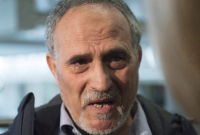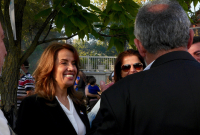Support strong Canadian climate journalism for 2025
As Canadians come together this weekend to commemorate the anniversary of the Quebec City mosque attack, we now — more than ever — need to stand up to hate and bigotry.
A source of inspiration is the strength of the survivors, the six women and 17 children who lost husbands and fathers in the space of a few terrifying seconds a year ago Monday.
Within hours of the shooting, Islamic Relief Canada, where I work, launched an appeal that raised more than $400,000, which went directly to victims’ families.
As we approached the one-year mark, and as the debate around Muslims and Islam in Quebec City rages, I travelled to Quebec City to hear what the widows had to say. The biggest change for them, of course, was becoming single-parent families who have lost their major breadwinner.
The six men that were killed were between the ages of 39 and 60. They came to Canada in search of better lives for their families. They were pillars of their community — contributing to charitable causes and integrating into Quebec society. Five of the six victims had very young children. Two of them, Mamadou Tanou Barry and Abdelkarim Hassane, left behind children as young as only a year old.
All the women told me about having to find new ways to make ends meet. One family had to sell their business while another widow gave up her studies in order to spend more time with her children, and hopefully, minimize the trauma. Others had to find ways to fill the income loss.
Psychological trauma a big concern
Dealing with the psychological trauma of children has, inevitably, been one of the biggest concerns to all the widows. Many spoke about their children feeling much more vulnerable and scared about life in general.
Some of the questions that they kept asking me were: "How do I pay for college? How do I tell them about their father? How can I guarantee they will be okay in the future?"
Restoring their sense of security and hope for the future is where the rest of us need to continue to step forward.
Despite all that the widows have gone through over the last year, they had nothing but praise for the thousands of people — of all backgrounds — who had extended generous support and love to them since the day of the tragedy. They were grateful for all of their blessings. They reminded me multiple times that they harbored no hatred towards anyone and that they just wanted peace and cohesion.
Another source of strength to the families has been knowing how incredibly brave and selfless many of their deceased or injured fathers were during the actual attack, a bravery that undoubtedly saved many additional lives.
The public response hasn’t, of course, been all sweetness and light — I also heard about negative comments on both mainstream and social media platforms, which inexplicably seem to equate their attempts at rebuilding their lives with not being mournful enough.

There are real-life consequences to hate
While my visit to Quebec City allowed me to hear the personal stories of these women first hand, it also made me realize that Quebec still has a long way to go if we want to combat the background noise that leads to this sort of Islamophobic hate and violence.
Thankfully, in the aftermath of the attack, politicians from across the spectrum condemned this act of hate. Premier Philippe Couillard delivered a message on unity and togetherness, and insisted that Quebecers are ‘all in this together.’
In 2017, however, hate crimes and hateful incidents targeting Muslims doubled in Quebec City to 42 from 21 in 2016.
The Quebec City mosque was targeted twice following the killings – with a defaced Quran and a hateful message sent to the mosque in July 2017, while in September 2017, the president of the Quebec City Islamic Cultural Centre’s car was torched. Both incidents were thought to be in response to the Muslim community’s ongoing effort to acquire a burial ground in or around the city.
Also, in October 2017, the Quebec National Assembly introduced the controversial Bill C62, requiring people giving or receiving public services to uncover their faces, which may lead to the further isolation and estrangement of the tiny fraction of Muslim women who choose to wear the face veil when in public.
On the anniversary of the attack, we should take time to consider the women and children who continue to live the real life consequences of deep hate and violence. The slow recovery of their lives and sense of security – alongside their emphatic rejection of any further hatred and division – is, quite simply, the most compelling response to the tragic shooting of last year.
— Reyhana Patel is the head of public relations at Islamic Relief Canada. She’s a former BBC journalist and former writer for The Huffington Post and The Independent newspaper in the U.K.






Comments